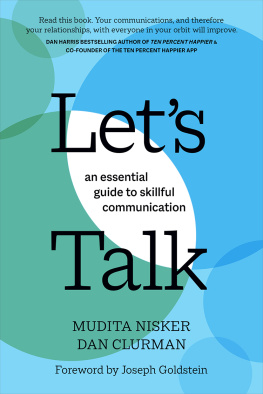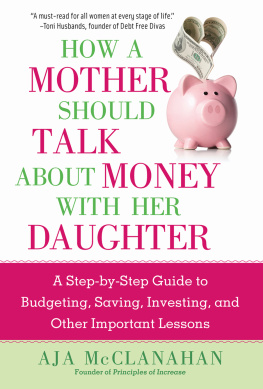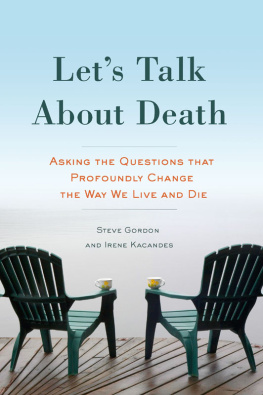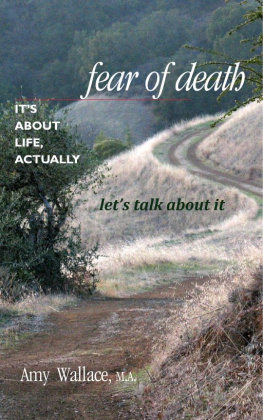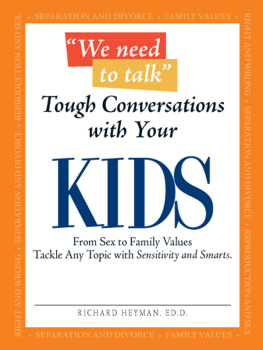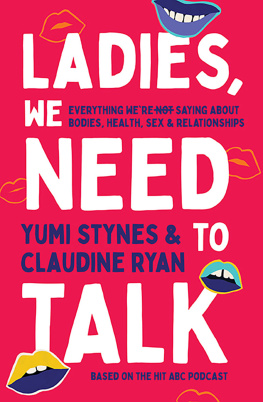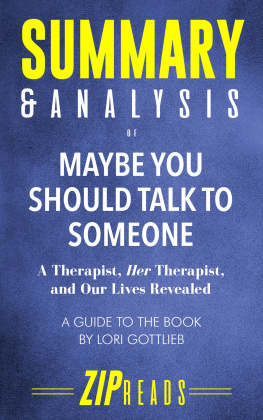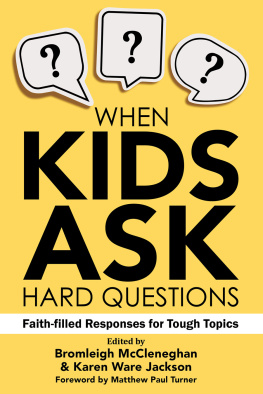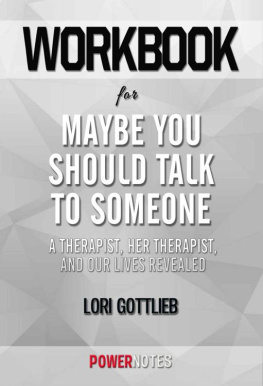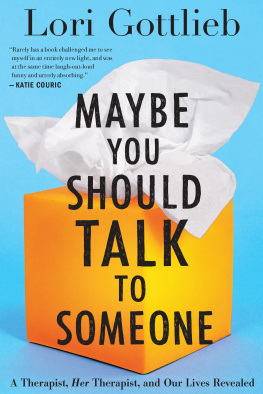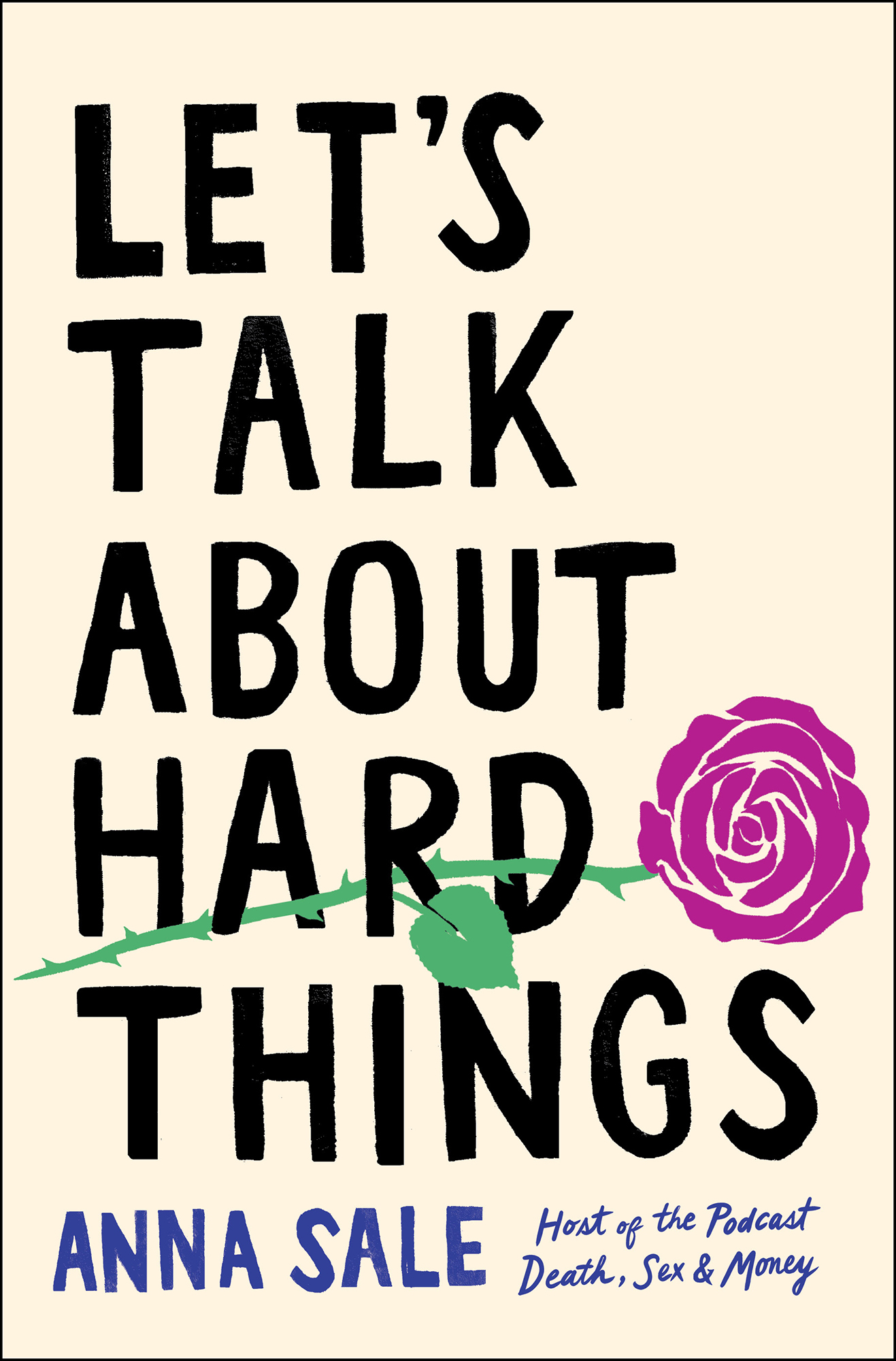
Lets Talk About Hard Things
Anna Sale
Host of the Podcast Death, Sex & Money

Simon & Schuster
1230 Avenue of the Americas
New York, NY 10020
www.SimonandSchuster.com
Names and identifying characteristics of some individuals have been changed.
Copyright 2021 by Anna Sale
All rights reserved, including the right to reproduce this book or portions thereof in any form whatsoever. For information, address Simon & Schuster Subsidiary Rights Department, 1230 Avenue of the Americas, New York, NY 10020.
First Simon & Schuster hardcover edition May 2021
SIMON & SCHUSTER and colophon are registered trademarks of Simon & Schuster, Inc.
For information about special discounts for bulk purchases, please contact Simon & Schuster Special Sales at 1-866-506-1949 or .
The Simon & Schuster Speakers Bureau can bring authors to your live event. For more information or to book an event, contact the Simon & Schuster Speakers Bureau at 1-866-248-3049 or visit our website at www.simonspeakers.com.
Interior design by Kyle Kabel
Jacket design and illustration by Kimberly Glyder
Library of Congress Cataloging-in-Publication Data has been applied for.
ISBN 978-1-5011-9024-7
ISBN 978-1-5011-9025-4 (ebook)
For Arthur
The values required for social repair are the same values required for personal repair.
Sarah Schulman
I remind myself all the time now that if I were to have been born mute, or had maintained an oath of silence my whole life long for safety, I would still have suffered, and I would still die. It is very good for establishing perspective.
Audre Lorde
Openness creates openness.
Ann Simpson
Introduction
W hen I was thirty years old, words failed me.
I couldnt stop my marriage from unraveling, despite going to couples counseling and church, despite buying new relationship books and rereading passages Id underlined in old ones. Wed been together since I was in college and had learned how to be adults together. We were best friends who loved each other. And then we were two people who couldnt be in the same room together.
At first the breakdown happened by such small degrees we didnt notice. Or rather, we noticed, but we didnt know what we were noticing. Each argument felt specific and isolated, but one by one they built up a lingering resentment that tore at our friendship. We tried to talk about it. We analyzed each individual argument and did our best to smooth over hurt feelings. I spent months trying to say everything I could think of that would recommit me to our marriage, re-endear me to him, and keep my life in line with what I thought it ought to look like.
That didnt work. Because, all the while, the underlying conflict went unsaid. Quite simply, we didnt want the same thing anymore.
Ours was a boring divorce. There were no real scandals. We had no children, no pets. My ex-husband and I mutually agreed to end the marriage. But it was still devastating and confusing. I couldnt explain what had happened, either to myself or anyone else. It would take years for me to make any sense of it.
This was new for me. I grew up with a certain faith that I could find the right words to navigate whatever life threw at me. I had two older sisters in college by the time I was in fourth grade, and they were always offering the long view on my pressing questions as I grew up: about friendships, drugs, sex, music. I just had to ask the right questions, and I could harvest their wisdom. I also kept notebooks scrawled with quotes from poetry, music lyrics, speeches, and booksscraps of insight to stow away for future use. When I became a political reporter at twenty-four, it was partly out of that same underlying belief, that with enough phone calls and stacks of documentsand the pitch-perfect questionI could uncover the truth and set the world right.
Sure, I knew it was a rosy view, but for a long time all my studying and digging and researching kept me feeling on track. That is, until I needed to decide whether to stay in my marriage, and what the hell to do if it was actually over. The answer was not something I could google. (I tried.) The truth was that no one else could tell me what to do. I needed to figure out my own choices and face the trade-offs that came with them.
What ultimately helped me to find a sense of clarity, little by little, was talking to other people about the choices theyd made when theyd felt lost. I had conversations with family members, friends, coworkers, and older mentors. They told me about their mistakes and where they got help when they needed it. They made me see how normal it is to find yourself grappling with uncertainty and despair. Theirs were messy stories, without neatly packaged lessons or aphorisms ready to be copied down in a journal. And, crucially, they made me feel like I wouldnt be alone as I began to figure out my next steps.
The stories stuck with me. Once I stumbled away from my marriage and began to put my life back together, I decided I wanted to keep having those deep conversations. I decided to make that my job.
I pitched my idea for Death, Sex & Money to my bosses at WNYC, New York Citys public radio station, as a show about the things that mattered most in life but that we talked about least: how death and loss, sex and relationships, and money and work shape all of our lives. I came up with the name for the show while I was out walking my dog, and I smiled at its boldness. Then I thought, What could be better? We flinch from these topics in public conversations, but they make up the most animating details of our lives! As I got the show started, I noticed that when I explained the idea to my interviewees, they leaned in. I told them that I would be asking about the hardest, loneliest things all of us go through, in the hopes that others might listen and feel less on their own. Our conversations became open, collaborative, and honest. It was like uncovering a buried passageway to unexpected emotional connection.
For seven years, the show has given me permission to explore who and how we love, how we survive and scrape by, and, of course, the urgency of it all, because we dont get to be here forever. Many of us have fight-or-flight responses when uncomfortable things come up, but we also have a deep need to share. We all want to be understood, and we all want to look like we are handling setbacks, pain, and alienation gracefully. But life is not so simple, and it doesnt help to pretend that it is. With every episode on the show, my goal has been to give all of us a little more permission to try, mess up, and try again.
Hard conversations in real life, however, are a lot trickier than they are on a podcast. For one, they dont take place in a radio studio, between strangers, with an editing crew at the ready. They occur in real time, with the people we love, when our emotions are tangled and raw. When tensions are high, a single conversation has the potential to solidify a relationship into a lifelong bond, or to send it spiraling toward doubt. In that sense, theres a reason we like to spill our guts to bartenders and podcast hosts. Because its downright terrifying to discuss the things that are most important to us with the people who are most important to us. Even so, the most meaningful moments of our lives hinge on the hard conversations we have with our family, friends, coworkers, and partners.


